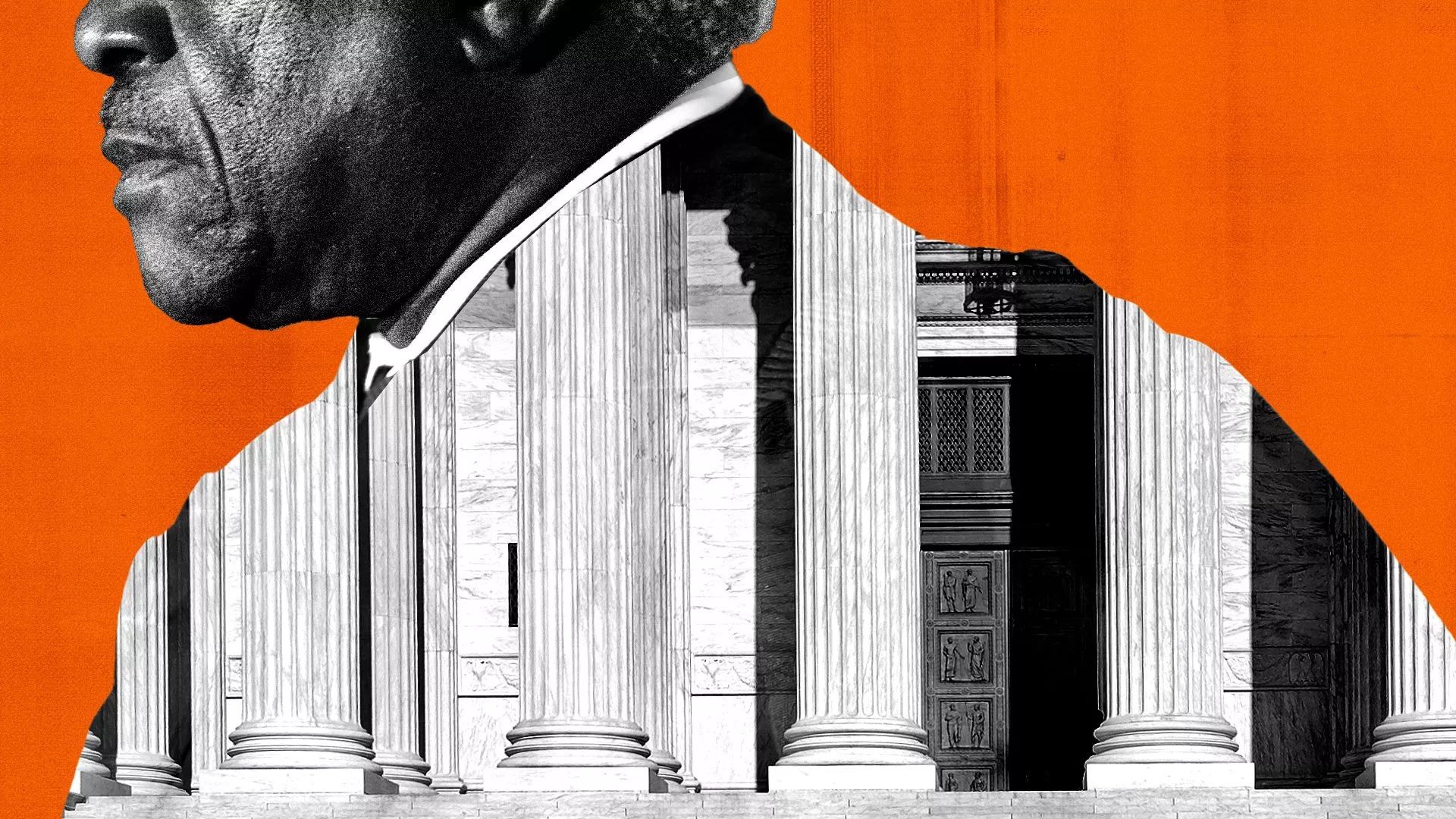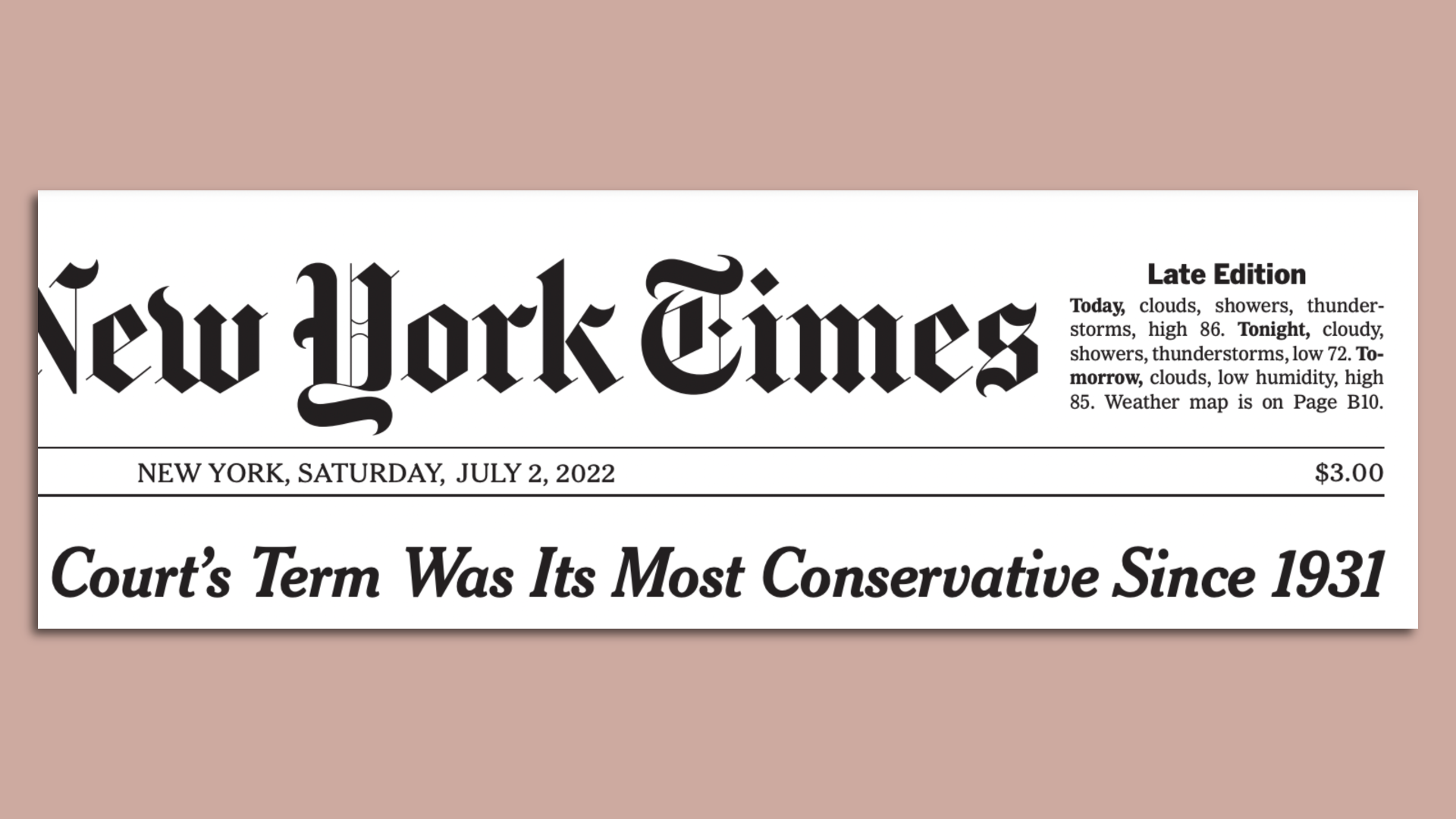| | | | | | | Presented By Meta | | | | Axios AM | | By Mike Allen · Jul 02, 2022 | | 🛥️ Happy holiday weekend. I'm off to my brother's lake house — wishing serenity to you and yours. And thanks to all of you, including my Axios colleagues, who are keeping the world turning over the weekend. - Smart Brevity™ count: 962 words ... 3½ mins. Edited by TuAnh Dam.
| | | | | | 1 big thing: Clarence Thomas at peak of his power |  | | | Photo illustration: Shoshana Gordon/Axios. Photo: Tasos Katopodis/Getty Images | | | | Justice Clarence Thomas is suddenly, for the first time since his confirmation, the main character at the Supreme Court. - Why it matters: Thomas is more powerful than ever inside the court. Ideas the legal establishment once treated as his quirky hobby horses now carry increasing weight, Axios' Sam Baker writes.
As the term barreled to a conclusion, Thomas handed down two bombshell opinions within 24 hours: - First came a majority ruling striking down strict limits on concealed weapons.
- The next day, he issued a concurring opinion on the court's abortion ruling. It said the justices should not only have struck down Roe v. Wade — but should also revisit other precedents, including the rights to contraception and same-sex marriage.
Thomas has spent years essentially laying out a whole parallel understanding of the law. He's one of the court's most prolific authors of solo dissents, according to Adam Feldman of Empirical SCOTUS, and has written a slew of solo concurrences similar to last week's. - Thomas doesn't just write a dissent here and an additional point about a majority holding there. Rather, he has created a whole ecosystem of opinions that build on and reference each other — almost in the same way as the court's actual precedents, except they're all one man speaking only for himself.
- Thomas' solo opinion in last week's abortion case cited 11 of his past opinions, 10 of which were solo opinions. It drew more heavily from the Clarence Thomas Cinematic Universe than from the rest of the court's historical precedents, dissents and non-Thomas concurrences.
🔮 What's next: As the makeup of the court has shifted around him, Thomas' views have gotten more influential. And that influence will only grow. - He has been a longstanding critic of the "administrative state," or the power of federal agencies — an area of law where the court will likely be particularly active over the next several years.
Keep reading. |     | | | | | | 2. Behind the scenes: Thomas' super-power | | This will be one of history's most famous courts. Here's the class picture from April 2021. Photo: Erin Schaff/The New York Times via AP A key quirk of the court's inner workings has helped elevate Justice Clarence Thomas, Axios' Sam Baker explains: - Once the justices decide how they're going to rule in a given case, the most senior justice in the majority decides who will get to write the ruling.
- A lot of power rests in that assignment. Thomas has rarely gotten to wield it — until now.
On the 6-3 court, Chief Justice John Roberts is the only justice more senior than Thomas. So any time Roberts joins the court's liberals, and the rest of the conservatives stay united, Thomas gets to decide who writes the majority ruling. - He can assign it to himself — or choose the colleague he believes will get closest to his own interpretation, while still keeping the majority intact.
Go deeper: "Democracy advocates raise alarm after Supreme Court takes election case" (WashPost) |     | | | | | | 3. ⚖️ Stat of the day |  | | | | 74%: That's the share of Supreme Court cases that had a conservative ruling in the term that ended Thursday, according to the term wrap-up by the N.Y. Times' Adam Liptak. - The term — this era's first with a six-justice conservative majority, and the most consequential in decades — was the most conservative since 1931, by one standard political-science measurement.
Why it matters: The transformative term included blockbuster decisions on abortion, guns, religion and climate. - "This has been a revolutionary term in so many respects," Tara Leigh Grove, a law professor at the University of Texas, told AP. "The court has massively changed constitutional law in really big ways."
🔎 The justices agreeing most often in divided rulings were Chief Justice John Roberts and Justice Brett Kavanaugh, at 98%, The Times found. - The two justices least likely to vote together in such cases were Justices Sonia Sotomayor and Clarence Thomas, at 14%.
Among appointees of presidents of different parties, the highest rate of agreement was between Roberts and Justice Elena Kagan — a mere 48%. |     | | | | | | A message from Meta | | Doctors can practice high-risk situations risk-free in the metaverse | | |  | | | | In the metaverse, future surgeons will be able to practice advanced procedures hundreds of times before seeing real patients – helping them gain experience and master their skills. The metaverse may be virtual, but the impact will be real. Learn how Meta is helping build the metaverse. | | | | | | 4. 📷 1,000 words | | Photo: Ethan Miller/Getty Images This sunken World War II-era Higgins landing craft, which used to be 185 feet underwater, is now visible in Lake Mead, Nevada, as the water recedes. - Lake Mead — a reservoir on the Colorado River that's part of the Hoover Dam system — is at its lowest level since being filled in 1937.
That's a result of the West's megadrought, coupled with increased water demands. |     | | | | | | 5. Google to delete location history for clinic visits | | A clinic escort and an anti-abortion protester try to direct a patient at Houston Women's Clinic last year. Photo: Evelyn Hockstein/Reuters Google announced it will soon start deleting the "Location History" entry if a user who is signed in to a Google app — including Gmail or YouTube — visits a "particularly personal" medical facility. - That includes counseling centers, domestic violence shelters, abortion clinics, fertility centers, addiction treatment facilities, weight loss clinics and cosmetic surgery clinics, Google said in a blog post.
- The change will take effect "in the coming weeks," Google said.
The big picture: Tech companies may soon face pressure to surrender abortion-related data in the wake of the Supreme Court's decision to overturn Roe v. Wade, Axios' Ina Fried writes. 🧠 Reality check: Google didn't commit to automatically deleting search histories about abortions, the N.Y. Times notes. Users must do so. |     | | | | | | 6. 🍔 Your picnic's big bite |  Data: American Farm Bureau Federation. Infographic: Thomas Oide, Allie Carl and Lindsey Bailey/Axios The average cost of a summer cookout for 10 is up an astonishing $10 from last year — to $69.68 — because of inflation, supply-chain kinks and the war in Ukraine, the American Farm Bureau Federation found. - Strawberries, sliced cheese and potato chips were down slightly —likely due to better weather conditions in some fruit-growing regions, and retailer pricing flexibility for processed products.
|     | | | | | | A message from Meta | | The metaverse may be virtual, but the impact will be real | | |  | | | | Meta is helping build the metaverse so aviation mechanics will be able to practice servicing different jet engines – preparing them for any complex job. The result: A more skilled workforce. Learn how Meta is helping build the metaverse. | | | | 📬 Invite your friends to sign up here for their daily essentials — Axios AM, PM and Finish Line. |  | It's called Smart Brevity®. Over 300 orgs use it — in a tool called Axios HQ — to drive productivity with clearer workplace communications. | | | |











No comments:
Post a Comment